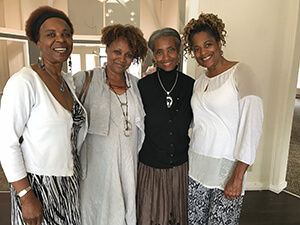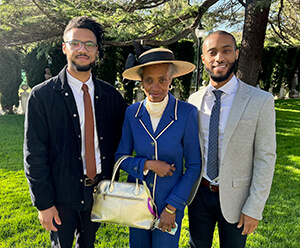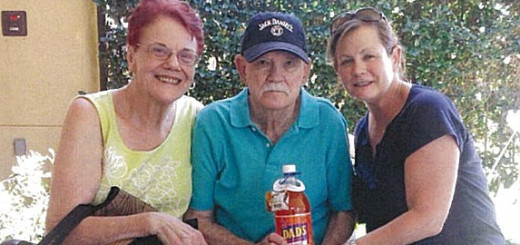Black dementia caregiver cares for his mother and his mental health
By Sharon Squires, RN
A person living with dementia can be challenging for any caregiver, regardless of race. The Black community traditionally are strong in caregiving responsibilities and will culturally rely on internal support groups and community organizations for their caregiving needs. Brandon, a Black man, is a caregiver for his mother who is living with the Alzheimer’s. He shares his personal struggles with anxiety and the importance of leaning on his family and his community for help.
Beverly’s Life Before Alzheimer’s
Brandon is the primary caregiver for his mother, Beverly, who lives with Alzheimer’s disease. Before her diagnosis, Beverly was very social, a chatty Kathy and well-liked by people. Even with dementia she talks with anyone who crosses her path.
When she was younger, Beverly used to collect Black artwork that reflected Black culture and creativity and used it to decorate her surroundings. “I found a document in a stack of papers,” said Brandon. “Mom wanted to start her own business in Interior Design. She was very ambitious and not afraid to venture out on her own. She was a leader in that way.”
Thinking back to his childhood, Brandon remembers that his mom used to take him to the bus stop every morning. “I was half asleep on her shoulder,” said Brandon. “She would drop me off at daycare and go to work at Kaiser. It was not Disneyland, but I remember her always caring for me.”
Brandon’s Introduction to Alzheimer’s Disease
Currently, Brandon is a busy man who works 12-to 13-hour days. He is involved in community activities and does his best to find time for a social life. As a young, college-educated Black man who is a native of Oakland, California, Brandon never thought he would also be caring for his mother.
As Beverly’s symptoms became more apparent, Brandon took her to the doctor, where she was formally diagnosed two and a half years ago [2021], with Alzheimer’s dementia in the middle stage.
Because Beverly lives alone and roughly 30 minutes from Brandon the family took some preventative measures for her own safety. They unhooked the stove and Brandon convinced his mom to voluntarily give him the car keys when she was made to believe the car needed repair.
“I admit that I am not a healthcare professional and have no prior knowledge regarding Alzheimer’s or dementia,” said Brandon. “I am a private person, [I] did not know where to turn for help and was unaware of the Alzheimer Association’s resources until recently. I performed research and taught myself about Alzheimer’s and dementia and watched many YouTube videos
that happened to be created by the Alzheimer’s Association.”
Supporting Mom
As the disease progressed Beverly started complaining that she was lonely. Brandon decided to hire a daytime caregiver. “I am the point person and manage all the finances, take calls, schedule appointments, pay bills, and care for household needs,” said Brandon. “I hired a caregiver for socialization, meals and activities of daily living.”
According to the Alzheimer’s Association 2023 Disease Facts and Figures report, Black male dementia caregivers are 3.3 times more likely to experience financial burdens when
compared with Black female and White male and female dementia caregivers (pg. 43).
In addition to the paid caregiver, Beverly’s two sisters come by a few times a week to take care of her day-to-day needs. “I have two Aunties that live nearby [my mom], and I mainly rely on them and the daytime caregiver for support in overseeing mom’s daily well-being,” said Brandon. “It is not the best solution, as mom needs 24-hour care, but it works until we can do better.”
The Facts and Figures report also states that 83% of the help provided to older adults with dementia in the United States comes from family members, friends, or other unpaid caregivers (pg. 41).
“I visit mom most weekends and call every morning by 10:45 a.m. to ensure she is up when the caregiver rings the doorbell at 11.” Brandon is one of three siblings; a brother in Michigan and a sister who lives and works full-time in Oakland. They both support and help when they can. “Usually, the closest loved ones in proximity and relationship (emotionally) cares for the parent,” Brandon said. “In this case, that would be me.”
Brandon and the family have visited several care settings to prepare for the next steps in Beverly’s care but found the cost so expensive, it is not something they could afford. According to the Facts and Figures report, the annual nursing home costs for individuals with dementia are estimated at $28,501 per person per year in 2010 which is $40,023 in 2022 (pg. 67).
Brandon Seeking Mental Help
According to the Facts and Figures report, 59% of family caregivers of people with Alzheimer’s or other dementias rated the emotional stress of caregiving as high or very high (pg. 46). Additionally, the prevalence of anxiety among dementia caregivers is 44%, which is higher that among caregivers of people with stroke (31%) (pg. 47).
Like many family caregivers, Brandon was experiencing anxiety about providing his mother with the best care. Brandon was suffering from sleepless nights and panic attacks. “I am an anxious person in general, but not knowing [what to do] and the steep learning curve was hard work and provided more anxiety in my life,” said Brandon. “I was living unhealthy, Mom was not getting the care she needed, and it was something that needed to be addressed.”
When asked what he was doing about his mental health, Brandon replied, “I was not handling it well. I was in crisis and had to seek therapy due to the anxiety and panic feelings in my chest, trying to take care of mom and the stress on the job.”
To help with his anxiety, Brandon started therapy however, due to his busy schedule, it only lasted a short while. In the meantime, Brandon has started engaging in physical exercise, sleeping more, and taking better care of himself to care for his mom. He said that he plans to do better going forward.
Brandon’s Advice to Other Caregivers
Facts and Figures report that Black/African-American dementia caregivers’ needs include greater education about dementia treatment, diagnosis, and care strategies; and better communication about dementia within the Black/ African-American community (pg. 43).
Brandon recognized in himself that he like to be private and had tried to do everything himself. He realized this probably was not the best thing he could do. Brandon recommends that other caregivers be more open about what is happening and to ask for help.
“Be transparent and tell everyone what you are really dealing with to attempt to get help,” said Brandon. “When people know, people will sympathize and empathize with you and assist you with getting the help you need. Sharing information with people can provide resources. If you are not transparent, people will not know, and you will not receive the help [you need].”
For more information on Alzheimer’s in the Black community visit alz.org/africanamerican. If you need resources or assistance, please contact the Alzheimer’s Association 24/7 Helpline at 800.272.3900.




















